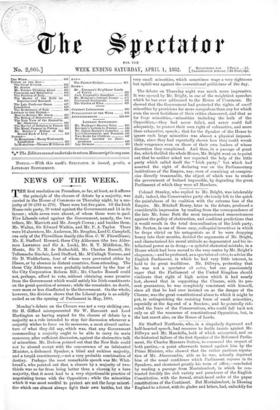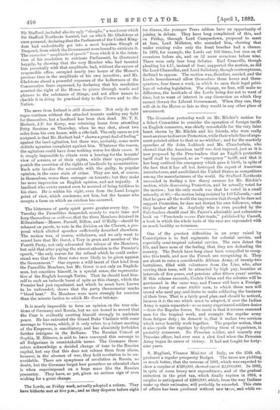Sir Stafford Northcote, who, in a singularly depressed and half-hearted
speech, had recourse to feeble taunts against Mr. Dillwyn and Mr. Mundella, both of which miscarried, and on the historical failure of the first Speaker of the Reformed Parlia- ment, Sir Charles Manners Sutton, to command the respect of both parties,—a point afterwards turned against him by the Prime Minister, who showed that the rather partisan reputa- tion of Mr. Abercrombie, able as he was, actually deprived him of the usual confidence which Parliament reposes in its Speakers, and shortened greatly his term of office,—concluded by reading a passage from Montalembert, in which he con- trasted forcibly the rich variety and paradoxes of the English Constitution, with the formal, strait-laced order of the paper constitutions of the Continent. But Montalembert, in likening England to a forest, with its glades and briars, had, unluckily for
Sir Stafford, included also its ugly "sloughs," a word over which Sir Stafford Northcote hurried, but on which Mr. Gladstone at once pounced, declaring that the Parliament of the United King- dom had undoubtedly got into a most hopeless Slough of Despond, from which the Government were bound to extricate it. The excessive "amplitude of speech" from which it is the inten- tion of his resolution to extricate Parliament, he illustrated happily, by showing that the very Member who had taunted him personally with that amplitude, had, without the excuse of responsible office, occupied nearly two hours of the -House's precious time in the amplitude of his own invective ; and Mr. Gladstone closed a powerful exposure of the hollowness of the Conservative fears expressed, by declaring that his resolution asserted the right of the House to pierce through words and phrases to the substance of things, and not allow names to shackle it in doing its practical duty to the Crown and to the Nation.















































 Previous page
Previous page